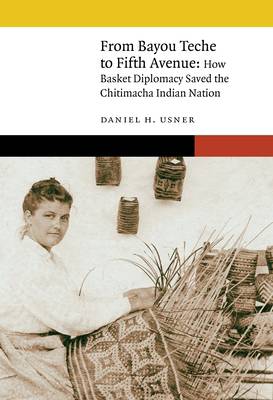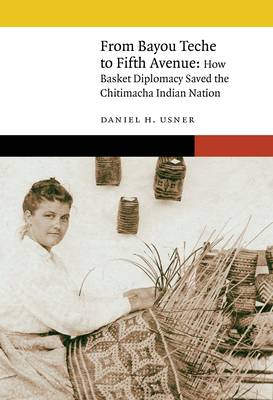
- Afhalen na 1 uur in een winkel met voorraad
- Gratis thuislevering in België vanaf € 30
- Ruim aanbod met 7 miljoen producten
- Afhalen na 1 uur in een winkel met voorraad
- Gratis thuislevering in België vanaf € 30
- Ruim aanbod met 7 miljoen producten
From Bayou Teche to Fifth Avenue
How Basket Diplomacy Saved the Chitimacha Indian Nation
Daniel H UsnerOmschrijving
Daniel H. Usner offers a cultural, political, and social history of the Chitimacha Tribe in South Louisiana and its struggle for political sovereignty. Between the 1890s and 1940s, Chitimacha Indian women in South Louisiana--with extraordinary baskets they created from rivercane--strategically built a network of allies that originated in a relationship with neighboring white women and that would eventually extend across the United States. Responding resourcefully to renewed interest in their basketry largely driven by the arts and crafts market and ethnographic collection, the Chitimachas were able to contact individuals and groups far from their home who possessed potential influence on government policy. Confronting at the same time perilous threats to their land, autonomy, and even their lives in the Jim Crow South, women in this Indigenous community were in essence weaving political allies as they wove their rivercane baskets.
Besides the considerable revenue Chitimacha baskets brought to tribal coffers, the story of the Chitimacha people and their predicament gained attention as their basketry appeared in major art gallery shows and museums and was sought by art collectors. By expanding the view beyond southern Louisiana and tracking the nationwide circulation of Chitimacha basketry, From Bayou Teche to Fifth Avenue illustrates how Indigenous people in North America have creatively confronted adversity and peril with aesthetic forms of expression.
Specificaties
Betrokkenen
- Auteur(s):
- Uitgeverij:
Inhoud
- Aantal bladzijden:
- 384
- Taal:
- Engels
- Reeks:
Eigenschappen
- Productcode (EAN):
- 9781496246691
- Verschijningsdatum:
- 1/08/2026
- Uitvoering:
- Hardcover
- Formaat:
- Genaaid
- Afmetingen:
- 152 mm x 229 mm

Alleen bij Standaard Boekhandel
Beoordelingen
We publiceren alleen reviews die voldoen aan de voorwaarden voor reviews. Bekijk onze voorwaarden voor reviews.







